Attached files
| file | filename |
|---|---|
| 8-K - 8-K - CAPSTEAD MORTGAGE CORP | cmo-8k_20180208.htm |
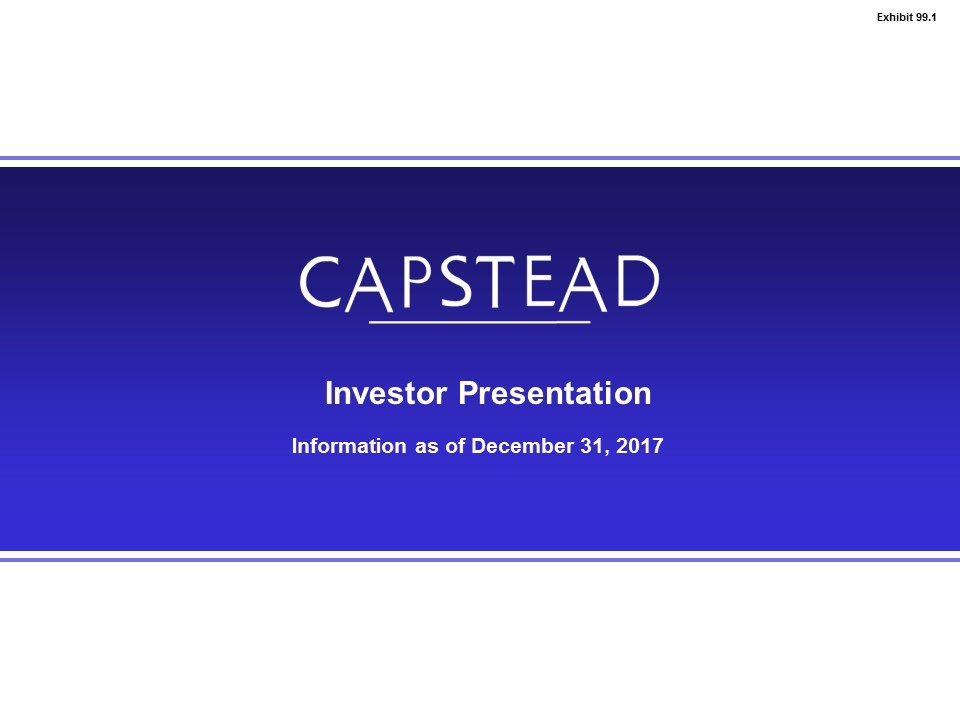
Information as of December 31, 2017 Investor Presentation Exhibit 99.1
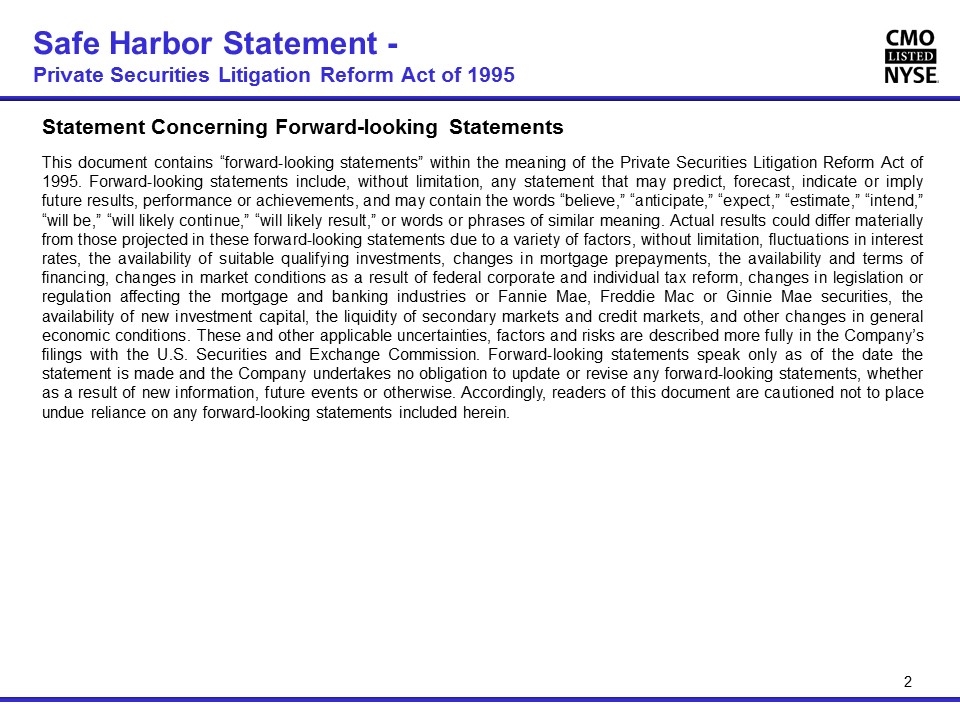
Safe Harbor Statement - Private Securities Litigation Reform Act of 1995 Statement Concerning Forward-looking Statements This document contains “forward-looking statements” within the meaning of the Private Securities Litigation Reform Act of 1995. Forward-looking statements include, without limitation, any statement that may predict, forecast, indicate or imply future results, performance or achievements, and may contain the words “believe,” “anticipate,” “expect,” “estimate,” “intend,” “will be,” “will likely continue,” “will likely result,” or words or phrases of similar meaning. Actual results could differ materially from those projected in these forward-looking statements due to a variety of factors, without limitation, fluctuations in interest rates, the availability of suitable qualifying investments, changes in mortgage prepayments, the availability and terms of financing, changes in market conditions as a result of federal corporate and individual tax reform, changes in legislation or regulation affecting the mortgage and banking industries or Fannie Mae, Freddie Mac or Ginnie Mae securities, the availability of new investment capital, the liquidity of secondary markets and credit markets, and other changes in general economic conditions. These and other applicable uncertainties, factors and risks are described more fully in the Company’s filings with the U.S. Securities and Exchange Commission. Forward-looking statements speak only as of the date the statement is made and the Company undertakes no obligation to update or revise any forward-looking statements, whether as a result of new information, future events or otherwise. Accordingly, readers of this document are cautioned not to place undue reliance on any forward-looking statements included herein. 2
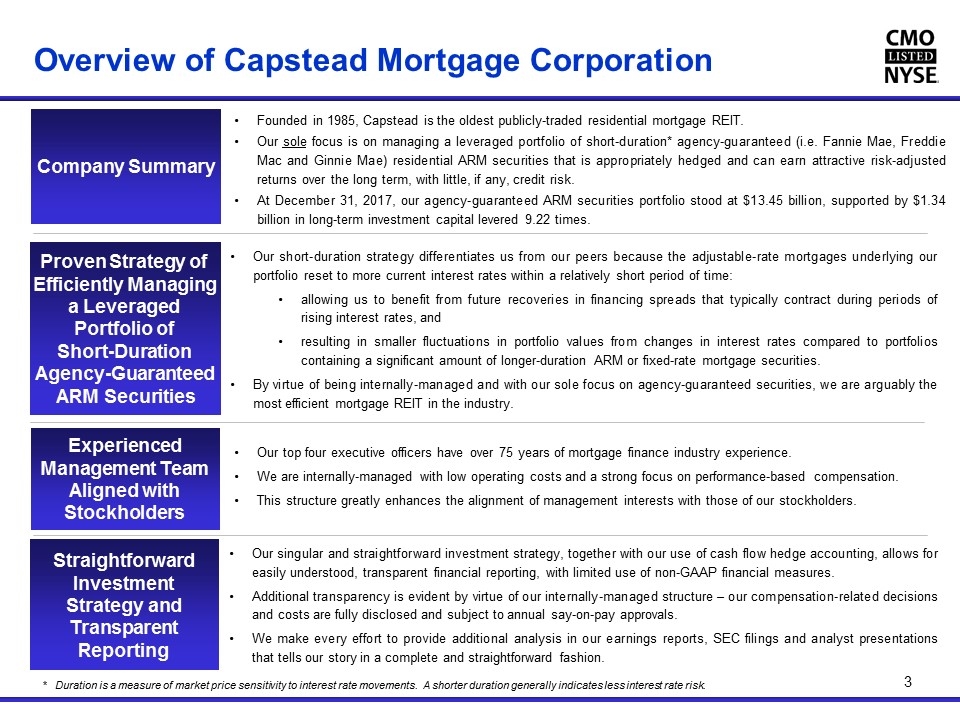
Company Summary Proven Strategy of Efficiently Managing a Leveraged Portfolio of Short-Duration Agency-Guaranteed ARM Securities Experienced Management Team Aligned with Stockholders Overview of Capstead Mortgage Corporation Founded in 1985, Capstead is the oldest publicly-traded residential mortgage REIT. Our sole focus is on managing a leveraged portfolio of short-duration* agency-guaranteed (i.e. Fannie Mae, Freddie Mac and Ginnie Mae) residential ARM securities that is appropriately hedged and can earn attractive risk-adjusted returns over the long term, with little, if any, credit risk. At December 31, 2017, our agency-guaranteed ARM securities portfolio stood at $13.45 billion, supported by $1.34 billion in long-term investment capital levered 9.22 times. Our short-duration strategy differentiates us from our peers because the adjustable-rate mortgages underlying our portfolio reset to more current interest rates within a relatively short period of time: allowing us to benefit from future recoveries in financing spreads that typically contract during periods of rising interest rates, and resulting in smaller fluctuations in portfolio values from changes in interest rates compared to portfolios containing a significant amount of longer-duration ARM or fixed-rate mortgage securities. By virtue of being internally-managed and with our sole focus on agency-guaranteed securities, we are arguably the most efficient mortgage REIT in the industry. Our top four executive officers have over 75 years of mortgage finance industry experience. We are internally-managed with low operating costs and a strong focus on performance-based compensation. This structure greatly enhances the alignment of management interests with those of our stockholders. 3 Our singular and straightforward investment strategy, together with our use of cash flow hedge accounting, allows for easily understood, transparent financial reporting, with limited use of non-GAAP financial measures. Additional transparency is evident by virtue of our internally-managed structure – our compensation-related decisions and costs are fully disclosed and subject to annual say-on-pay approvals. We make every effort to provide additional analysis in our earnings reports, SEC filings and analyst presentations that tells our story in a complete and straightforward fashion. Straightforward Investment Strategy and Transparent Reporting * Duration is a measure of market price sensitivity to interest rate movements. A shorter duration generally indicates less interest rate risk.
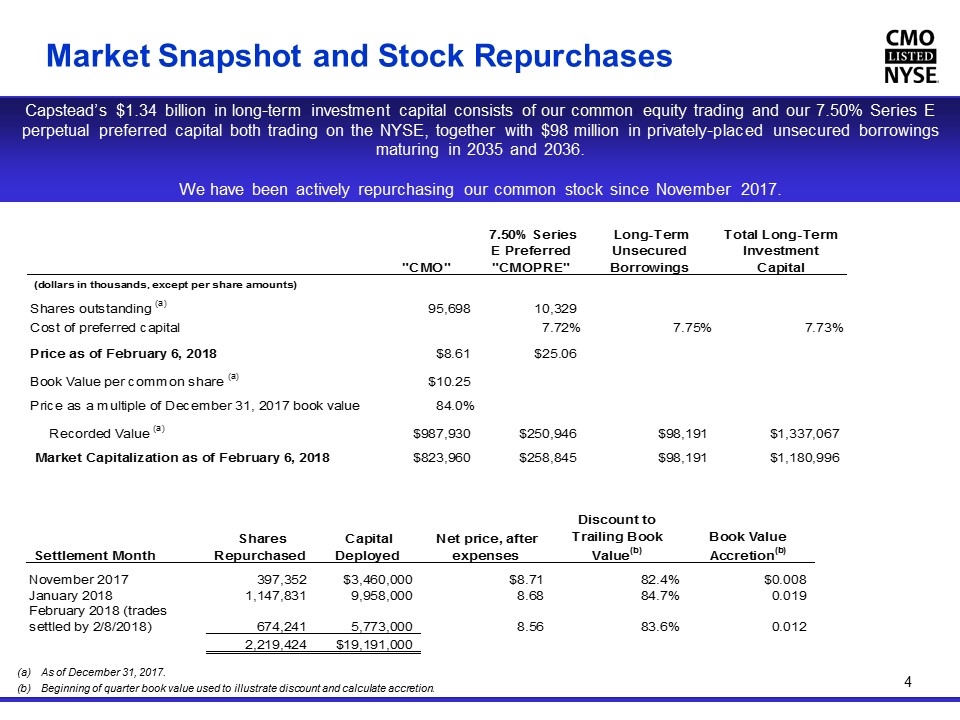
Market Snapshot and Stock Repurchases 4 As of December 31, 2017. Beginning of quarter book value used to illustrate discount and calculate accretion. Capstead’s $1.34 billion in long-term investment capital consists of our common equity trading and our 7.50% Series E perpetual preferred capital both trading on the NYSE, together with $98 million in privately-placed unsecured borrowings maturing in 2035 and 2036. We have been actively repurchasing our common stock since November 2017.
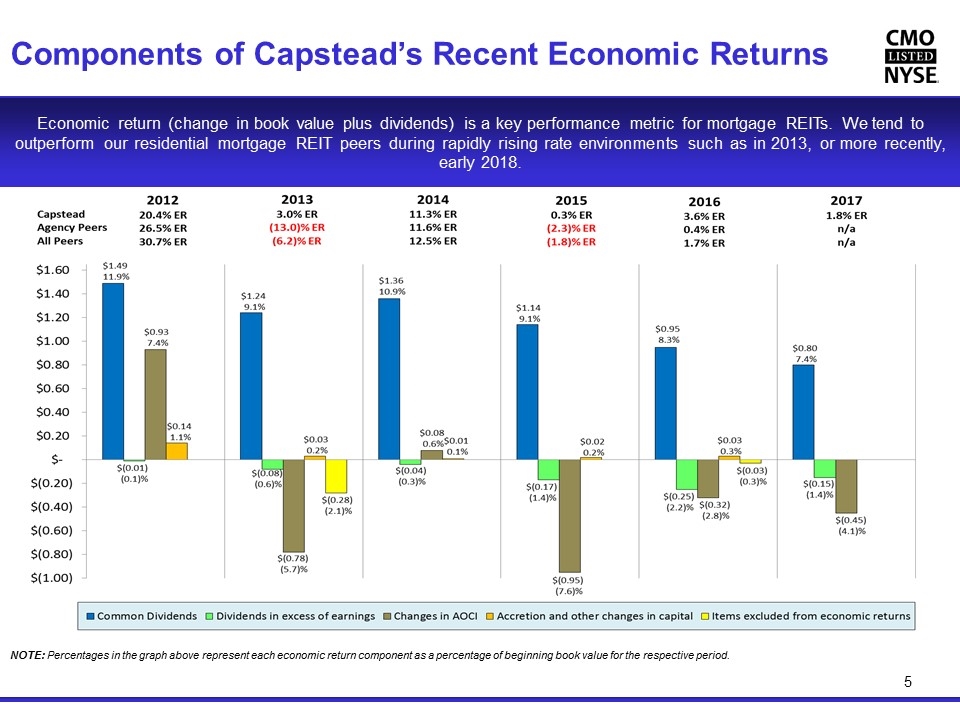
Components of Capstead’s Recent Economic Returns 5 * Economic return (change in book value plus dividends) is a key performance metric for mortgage REITs. We tend to outperform our residential mortgage REIT peers during rapidly rising rate environments such as in 2013, or more recently, early 2018. NOTE: Percentages in the graph above represent each economic return component as a percentage of beginning book value for the respective period.
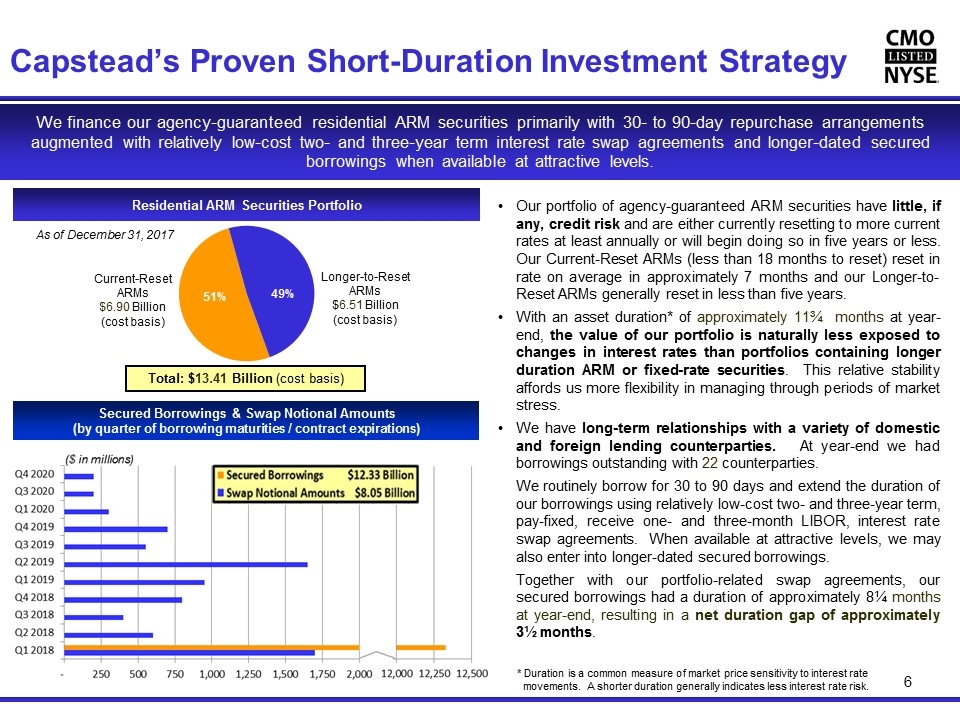
Capstead’s Proven Short-Duration Investment Strategy 6 As of December 31, 2017 We finance our agency-guaranteed residential ARM securities primarily with 30- to 90-day repurchase arrangements augmented with relatively low-cost two- and three-year term interest rate swap agreements and longer-dated secured borrowings when available at attractive levels. Residential ARM Securities Portfolio Secured Borrowings & Swap Notional Amounts (by quarter of borrowing maturities / contract expirations) Total: $13.41 Billion (cost basis) Our portfolio of agency-guaranteed ARM securities have little, if any, credit risk and are either currently resetting to more current rates at least annually or will begin doing so in five years or less. Our Current-Reset ARMs (less than 18 months to reset) reset in rate on average in approximately 7 months and our Longer-to-Reset ARMs generally reset in less than five years. With an asset duration* of approximately 11¾ months at year-end, the value of our portfolio is naturally less exposed to changes in interest rates than portfolios containing longer duration ARM or fixed-rate securities. This relative stability affords us more flexibility in managing through periods of market stress. We have long-term relationships with a variety of domestic and foreign lending counterparties. At year-end we had borrowings outstanding with 22 counterparties. We routinely borrow for 30 to 90 days and extend the duration of our borrowings using relatively low-cost two- and three-year term, pay-fixed, receive one- and three-month LIBOR, interest rate swap agreements. When available at attractive levels, we may also enter into longer-dated secured borrowings. Together with our portfolio-related swap agreements, our secured borrowings had a duration of approximately 8¼ months at year-end, resulting in a net duration gap of approximately 3½ months. Longer-to-Reset ARMs $6.51 Billion (cost basis) Current-Reset ARMs $6.90 Billion (cost basis) * Duration is a common measure of market price sensitivity to interest rate movements. A shorter duration generally indicates less interest rate risk.
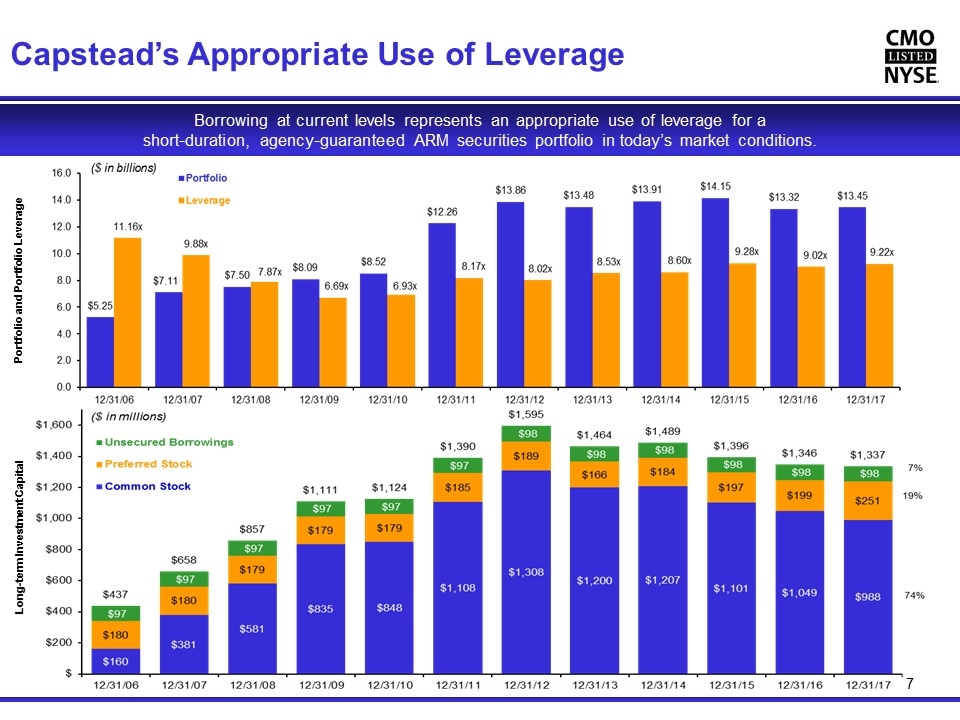
Capstead’s Appropriate Use of Leverage 7 Portfolio and Portfolio Leverage Borrowing at current levels represents an appropriate use of leverage for a short-duration, agency-guaranteed ARM securities portfolio in today’s market conditions. Long-term Investment Capital
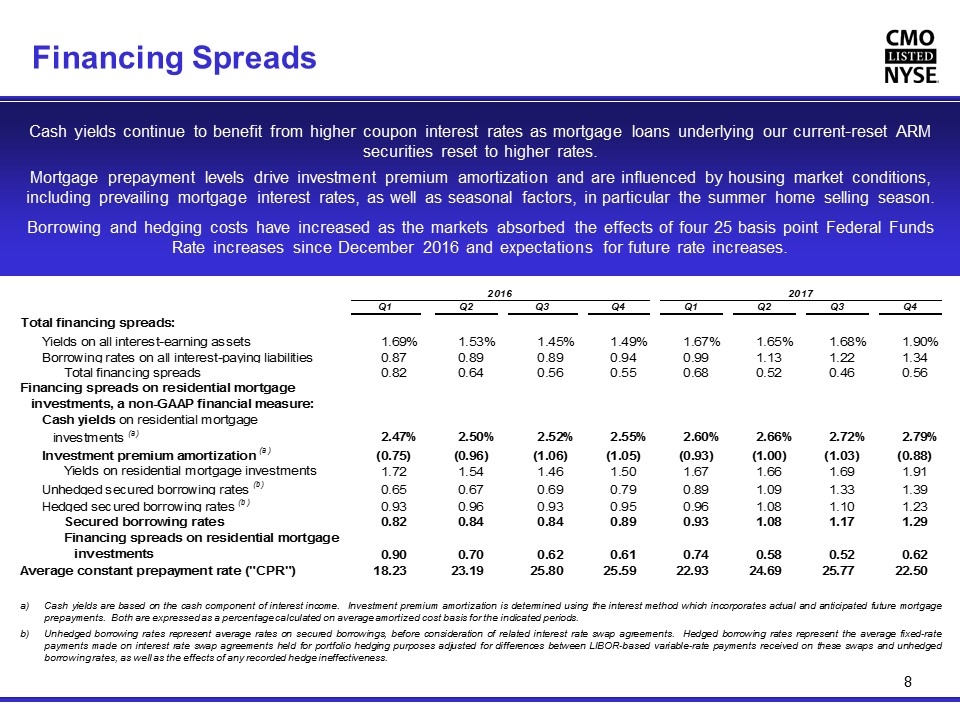
Financing Spreads 8 Cash yields continue to benefit from higher coupon interest rates as mortgage loans underlying our current-reset ARM securities reset to higher rates. Mortgage prepayment levels drive investment premium amortization and are influenced by housing market conditions, including prevailing mortgage interest rates, as well as seasonal factors, in particular the summer home selling season. Borrowing and hedging costs have increased as the markets absorbed the effects of four 25 basis point Federal Funds Rate increases since December 2016 and expectations for future rate increases. Cash yields are based on the cash component of interest income. Investment premium amortization is determined using the interest method which incorporates actual and anticipated future mortgage prepayments. Both are expressed as a percentage calculated on average amortized cost basis for the indicated periods. Unhedged borrowing rates represent average rates on secured borrowings, before consideration of related interest rate swap agreements. Hedged borrowing rates represent the average fixed-rate payments made on interest rate swap agreements held for portfolio hedging purposes adjusted for differences between LIBOR-based variable-rate payments received on these swaps and unhedged borrowing rates, as well as the effects of any recorded hedge ineffectiveness. 2016 2017 Q1 Q2 Q3 Q4 Q1 Q2 Q3 Q4 Total financing spreads: Yields on all interest-earning assets 1.6899999999999998E-2 1.5299999999999999E-2 1.4500000000000001E-2 1.49E-2 1.6744443138806513E-2 1.6538044539174877E-2 1.6815378021486818E-2 1.9E-2 Borrowing rates on all interest-paying liabilities 0.87 0.89 0.89 0.94 0.98905919200084558 1.1348020394569407 1.2196301189627354 1.34 Total financing spreads 0.82 0.64 0.56000000000000005 0.55000000000000004 0.67538512187980571 0.51900241446054696 0.46190768318594633 0.56000000000000005 Financing spreads on residential mortgage investments, a non-GAAP financial measure: Cash yields on residential mortgage investments (a) 2.47E-2 2.5000000000000001E-2 2.52E-2 2.5499999999999998E-2 2.601829951035E-2 2.65932394112556E-2 2.7199999999999998E-2 2.7900000000000001E-2 Investment premium amortization (a) -0.75 -0.96 -1.06 -1.05 -0.9276201189174802 -0.99722995542878301 -1.0344784968147631 -0.88 Yields on residential mortgage investments 1.72 1.54 1.46 1.5 1.6742098321175169 1.6620939856967749 1.6893229147754669 1.91 Unhedged secured borrowing rates (b) 0.65 0.67 0.69 0.79 0.89120993516127578 1.0910109354249296 1.328561732233918 1.39 Hedged secured borrowing rates (b) 0.93 0.96 0.93 0.95 0.95657351995620687 1.0779900805029872 1.0983795041158759 1.23 Secured borrowing rates 0.82 0.84 0.84 0.89 0.93451370095067998 1.0829259612566788 1.1683002581666346 1.29 Financing spreads on residential mortgage investments 0.9 0.7 0.62 0.61 0.73969613116683708 0.57916802444009596 0.52102265660883218 0.62 Average constant prepayment rate ("CPR") 18.23 23.19 25.8 25.59 22.929172637324434 24.69 25.77 22.5 akes snes
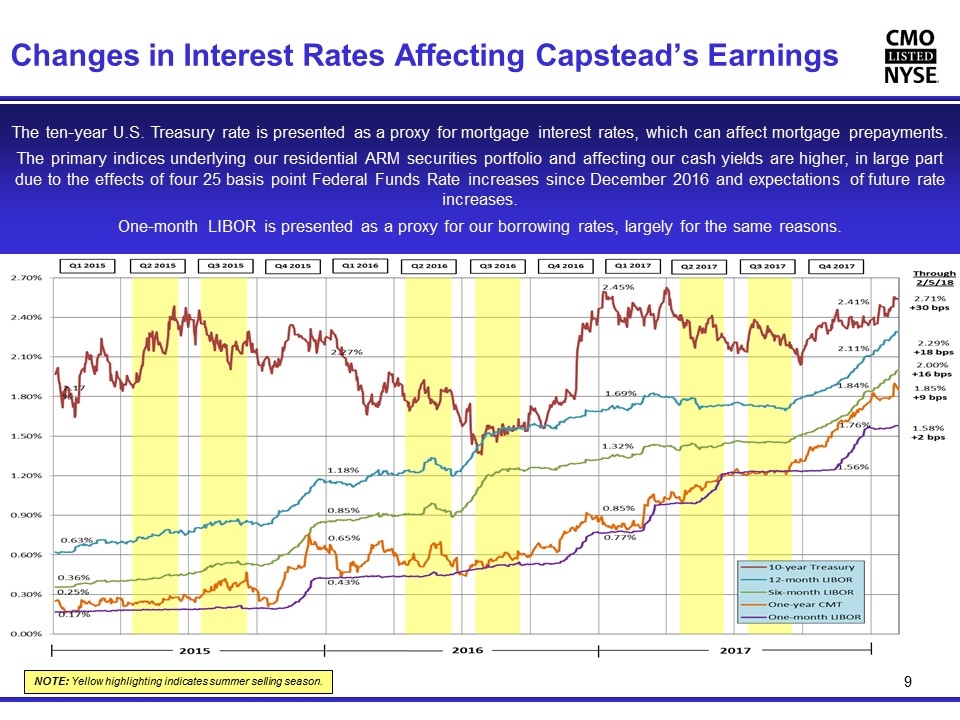
Changes in Interest Rates Affecting Capstead’s Earnings The ten-year U.S. Treasury rate is presented as a proxy for mortgage interest rates, which can affect mortgage prepayments. The primary indices underlying our residential ARM securities portfolio and affecting our cash yields are higher, in large part due to the effects of four 25 basis point Federal Funds Rate increases since December 2016 and expectations of future rate increases. One-month LIBOR is presented as a proxy for our borrowing rates, largely for the same reasons. 9 NOTE: Yellow highlighting indicates summer selling season.
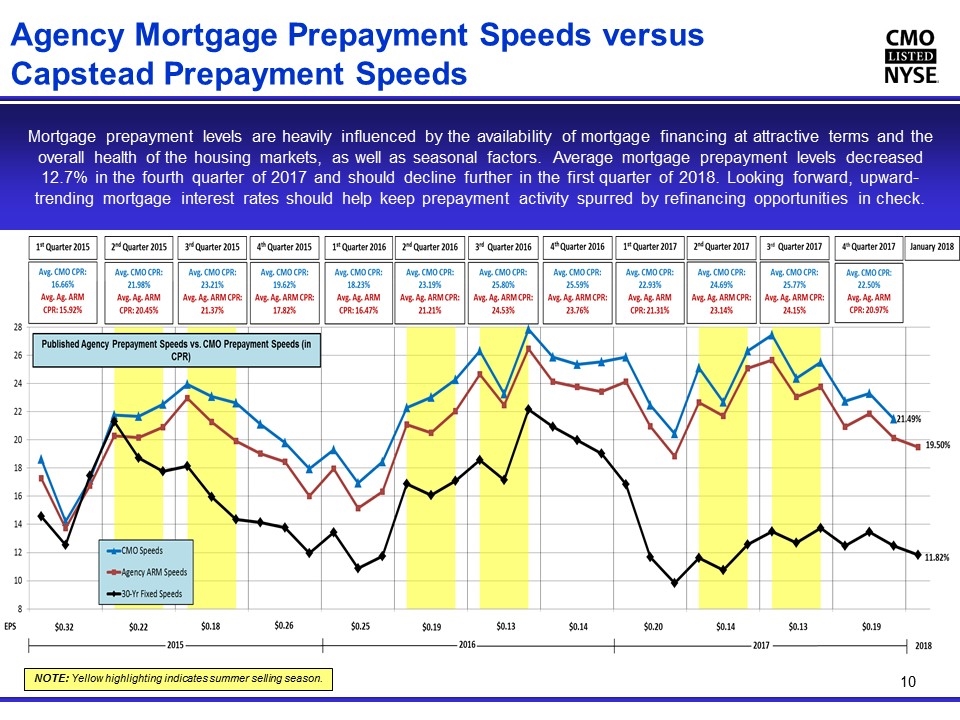
Agency Mortgage Prepayment Speeds versus Capstead Prepayment Speeds Mortgage prepayment levels are heavily influenced by the availability of mortgage financing at attractive terms and the overall health of the housing markets, as well as seasonal factors. Average mortgage prepayment levels decreased 12.7% in the fourth quarter of 2017 and should decline further in the first quarter of 2018. Looking forward, upward-trending mortgage interest rates should help keep prepayment activity spurred by refinancing opportunities in check. NOTE: Yellow highlighting indicates summer selling season. 10
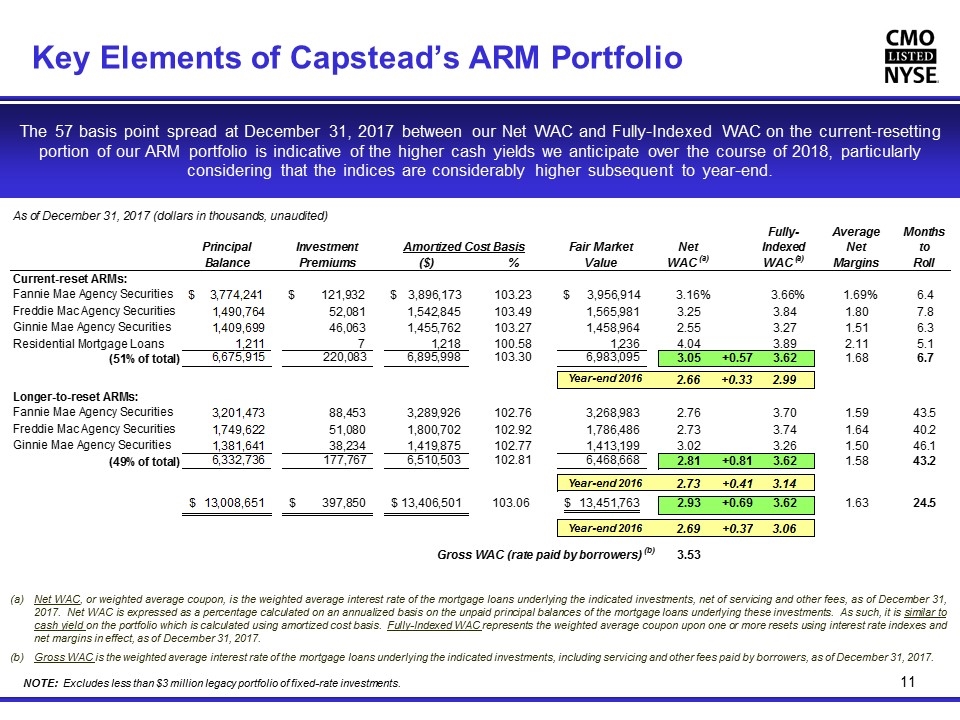
Key Elements of Capstead’s ARM Portfolio 11 NOTE: Excludes less than $3 million legacy portfolio of fixed-rate investments. The 57 basis point spread at December 31, 2017 between our Net WAC and Fully-Indexed WAC on the current-resetting portion of our ARM portfolio is indicative of the higher cash yields we anticipate over the course of 2018, particularly considering that the indices are considerably higher subsequent to year-end. Net WAC, or weighted average coupon, is the weighted average interest rate of the mortgage loans underlying the indicated investments, net of servicing and other fees, as of December 31, 2017. Net WAC is expressed as a percentage calculated on an annualized basis on the unpaid principal balances of the mortgage loans underlying these investments. As such, it is similar to cash yield on the portfolio which is calculated using amortized cost basis. Fully-Indexed WAC represents the weighted average coupon upon one or more resets using interest rate indexes and net margins in effect, as of December 31, 2017. Gross WAC is the weighted average interest rate of the mortgage loans underlying the indicated investments, including servicing and other fees paid by borrowers, as of December 31, 2017. As of December 31, 2017 (dollars in thousands, unaudited) Fully- Average Months Principal Investment Amortized Cost Basis Fair Market Net Indexed Net to Balance Premiums ($) % Value WAC(a) WAC(a) Margins Roll Current-reset ARMs: Fannie Mae Agency Securities $3,774,241 $,121,932 $3,896,173 103.23063630541876 $3,956,914 3.16% 3.66% 1.69% 6.4 Freddie Mac Agency Securities 1,490,764 52,081 1,542,845 103.49357778964344 1,565,981 3.25 3.84 1.8 7.8 Ginnie Mae Agency Securities 1,409,699 46,063 1,455,762 103.26757697919911 1,458,964 2.5499999999999998 3.27 1.51 6.3 Residential Mortgage Loans 1,211 7 1,218 100.57803468208093 1,236 4.04 3.89 2.11 5.0999999999999996 (51% of total) 6,675,915 ,220,083 6,895,998 103.29667169219501 6,983,095 3.05 +0.57 3.62 1.68 6.7 Year-end 2016 2.66 +0.33 2.99 Longer-to-reset ARMs: Fannie Mae Agency Securities 3,201,473 88,453 3,289,926 102.76288445974713 3,268,983 2.76 3.7 1.59 43.5 Freddie Mac Agency Securities 1,749,622 51,080 1,800,702 102.91948775221162 1,786,486 2.73 3.74 1.64 40.200000000000003 Ginnie Mae Agency Securities 1,381,641 38,234 1,419,875 102.76728904252262 1,413,199 3.02 3.26 1.5 46.1 (49% of total) 6,332,736 ,177,767 6,510,503 102.80711212341711 6,468,668 2.81 +0.81 3.62 1.58 43.2 Year-end 2016 2.73 +0.41 3.14 $13,008,651 $,397,850 $13,406,501 103.05834940148675 $13,451,763 2.93 +0.69 3.62 1.63 24.5 Year-end 2016 2.69 +0.37 3.06 Gross WAC (rate paid by borrowers)(b) 3.53
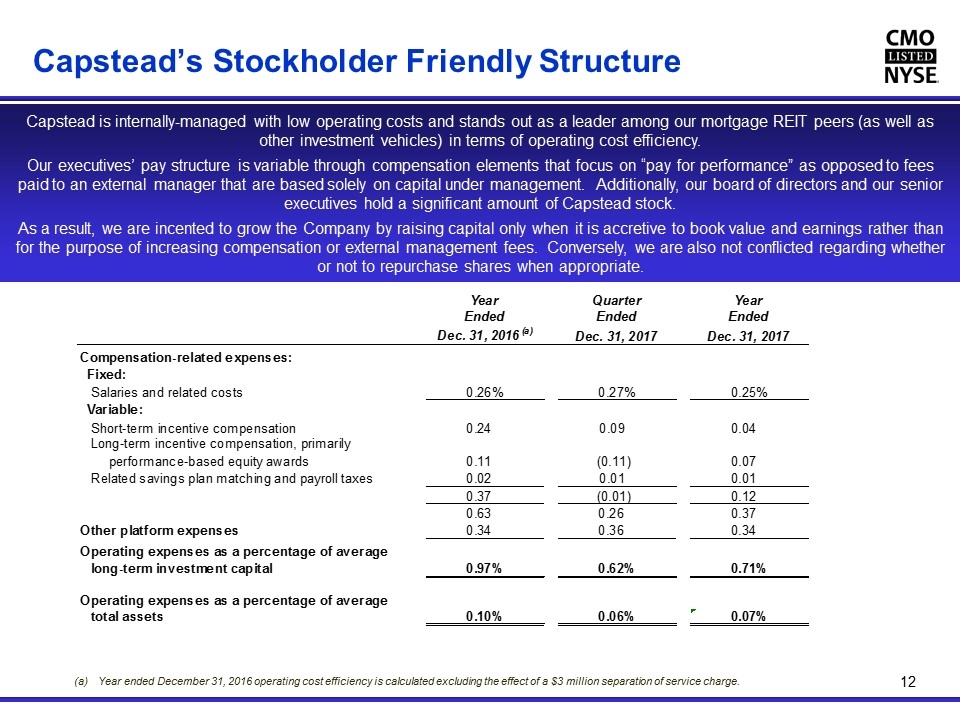
Capstead’s Stockholder Friendly Structure 12 Year ended December 31, 2016 operating cost efficiency is calculated excluding the effect of a $3 million separation of service charge. Capstead is internally-managed with low operating costs and stands out as a leader among our mortgage REIT peers (as well as other investment vehicles) in terms of operating cost efficiency. Our executives’ pay structure is variable through compensation elements that focus on “pay for performance” as opposed to fees paid to an external manager that are based solely on capital under management. Additionally, our board of directors and our senior executives hold a significant amount of Capstead stock. As a result, we are incented to grow the Company by raising capital only when it is accretive to book value and earnings rather than for the purpose of increasing compensation or external management fees. Conversely, we are also not conflicted regarding whether or not to repurchase shares when appropriate.
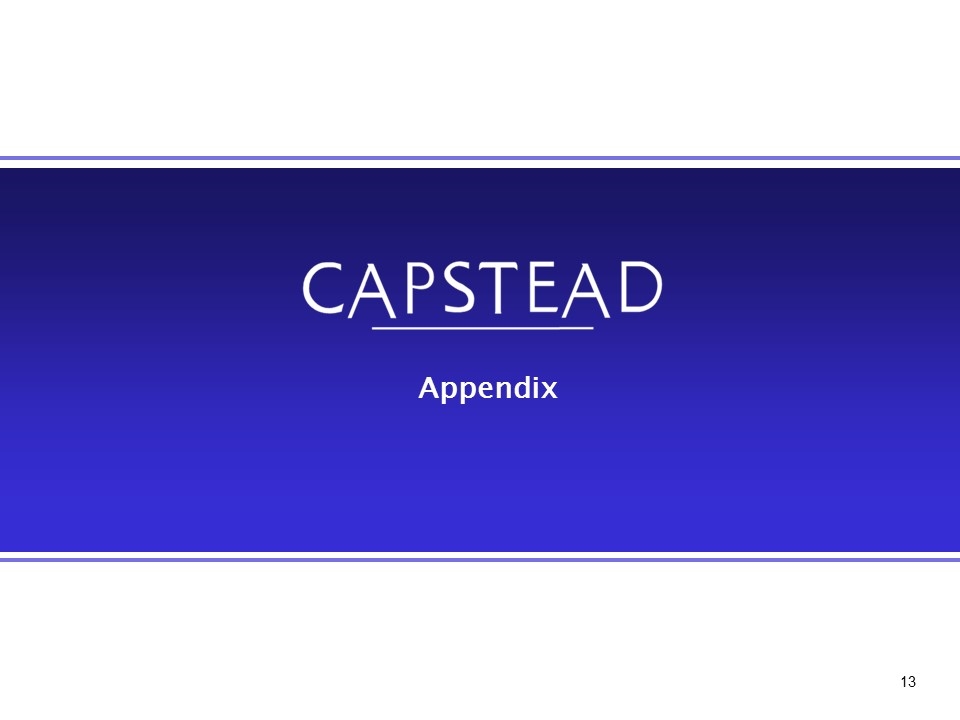
Appendix 13
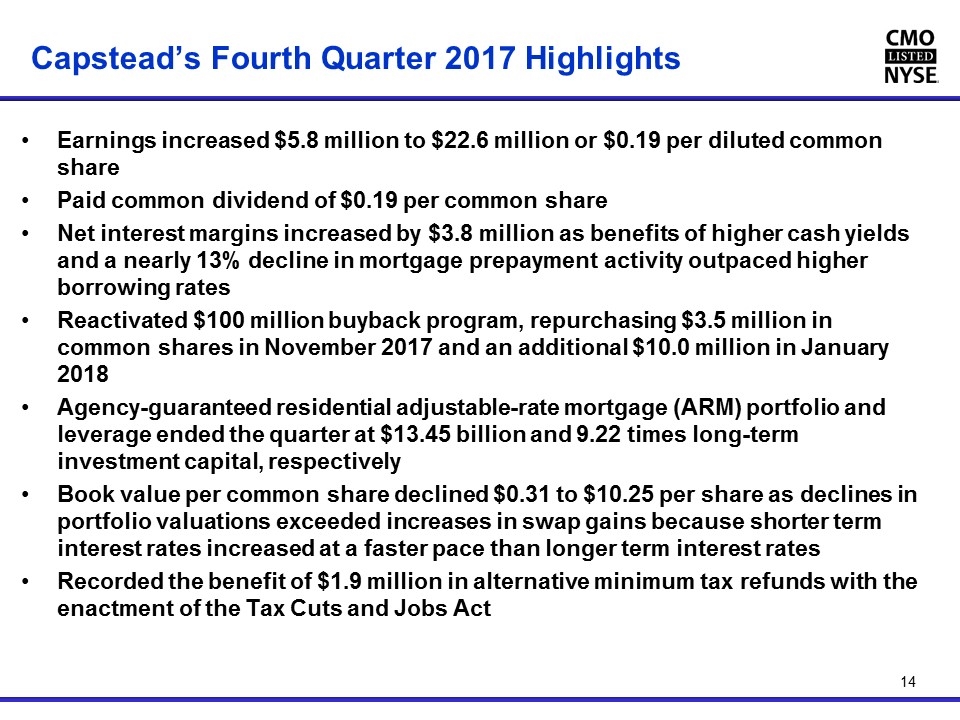
Capstead’s Fourth Quarter 2017 Highlights Earnings increased $5.8 million to $22.6 million or $0.19 per diluted common share Paid common dividend of $0.19 per common share Net interest margins increased by $3.8 million as benefits of higher cash yields and a nearly 13% decline in mortgage prepayment activity outpaced higher borrowing rates Reactivated $100 million buyback program, repurchasing $3.5 million in common shares in November 2017 and an additional $10.0 million in January 2018 Agency-guaranteed residential adjustable-rate mortgage (ARM) portfolio and leverage ended the quarter at $13.45 billion and 9.22 times long-term investment capital, respectively Book value per common share declined $0.31 to $10.25 per share as declines in portfolio valuations exceeded increases in swap gains because shorter term interest rates increased at a faster pace than longer term interest rates Recorded the benefit of $1.9 million in alternative minimum tax refunds with the enactment of the Tax Cuts and Jobs Act 14
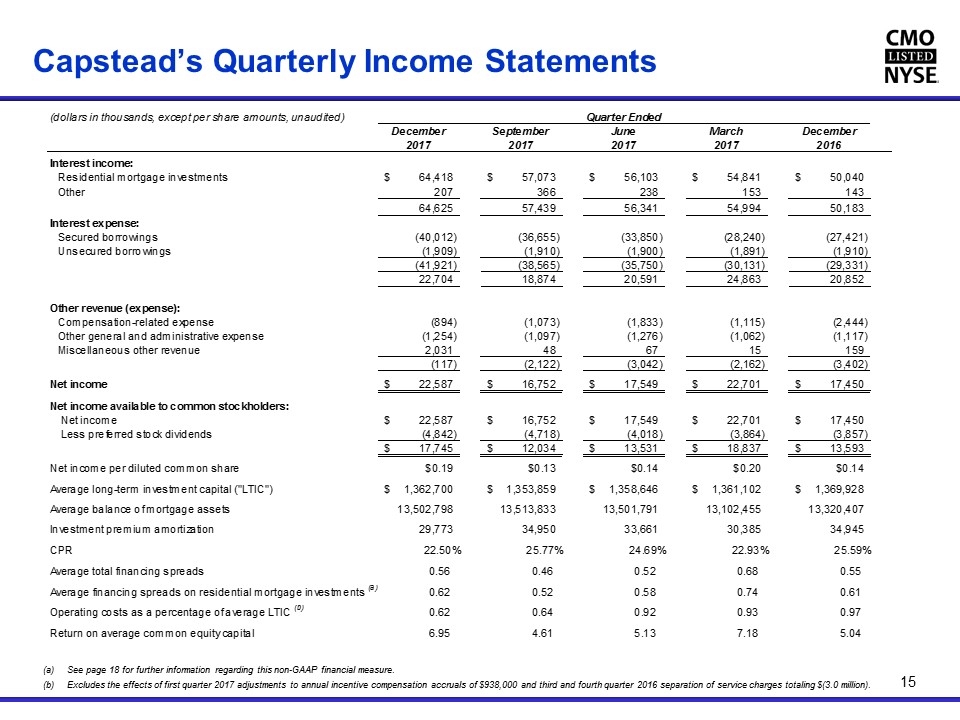
Capstead’s Quarterly Income Statements 15 See page 18 for further information regarding this non-GAAP financial measure. Excludes the effects of first quarter 2017 adjustments to annual incentive compensation accruals of $938,000 and third and fourth quarter 2016 separation of service charges totaling $(3.0 million).
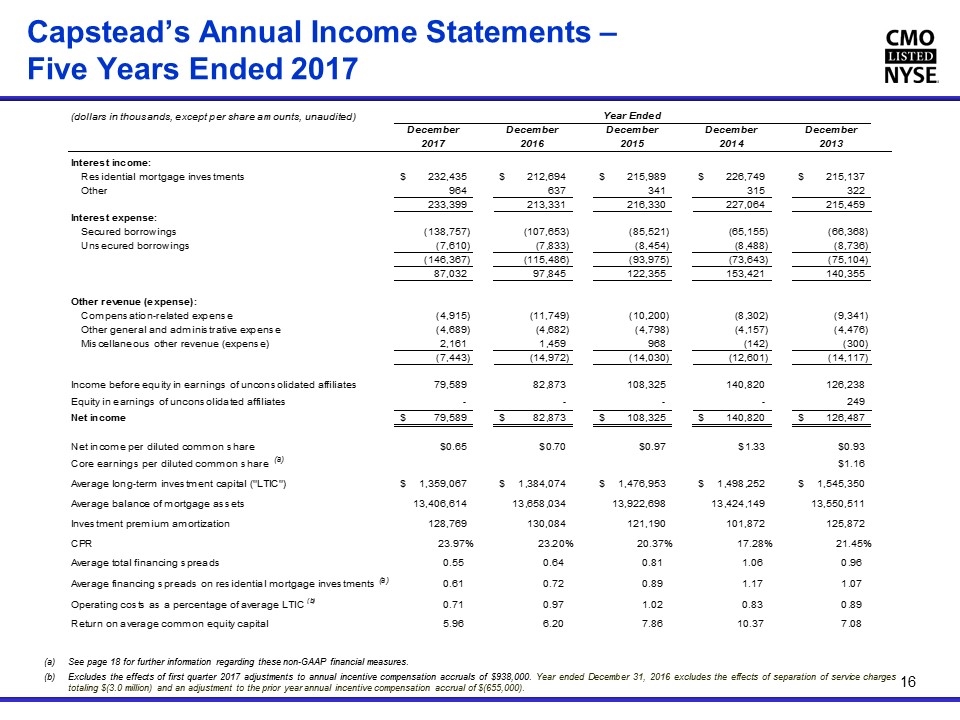
Capstead’s Annual Income Statements – Five Years Ended 2017 16 See page 18 for further information regarding these non-GAAP financial measures. Excludes the effects of first quarter 2017 adjustments to annual incentive compensation accruals of $938,000. Year ended December 31, 2016 excludes the effects of separation of service charges totaling $(3.0 million) and an adjustment to the prior year annual incentive compensation accrual of $(655,000).
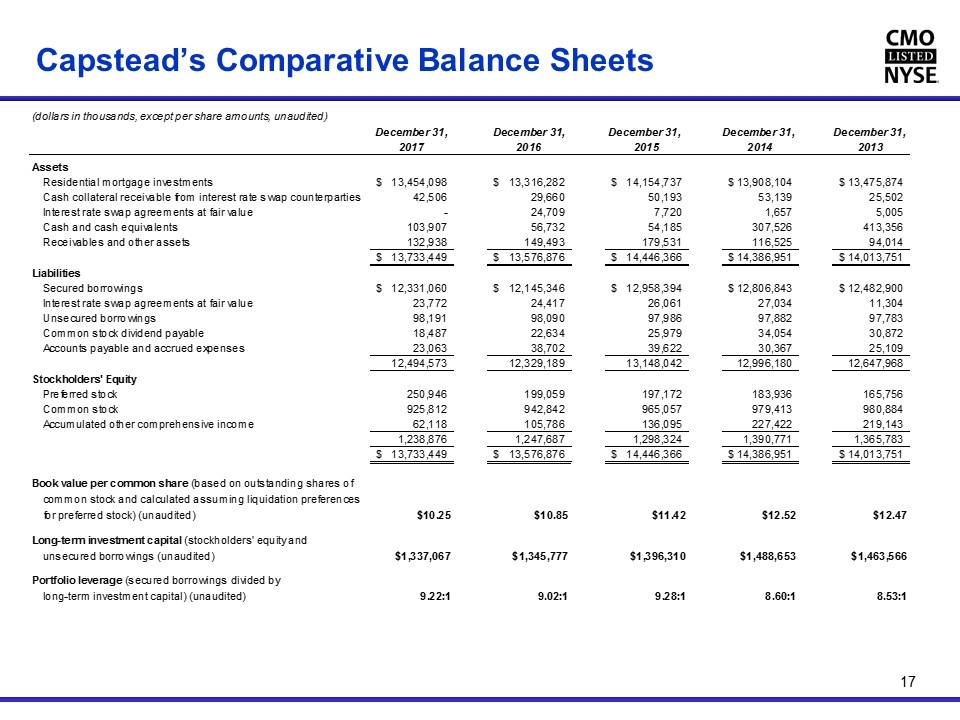
Capstead’s Comparative Balance Sheets 17
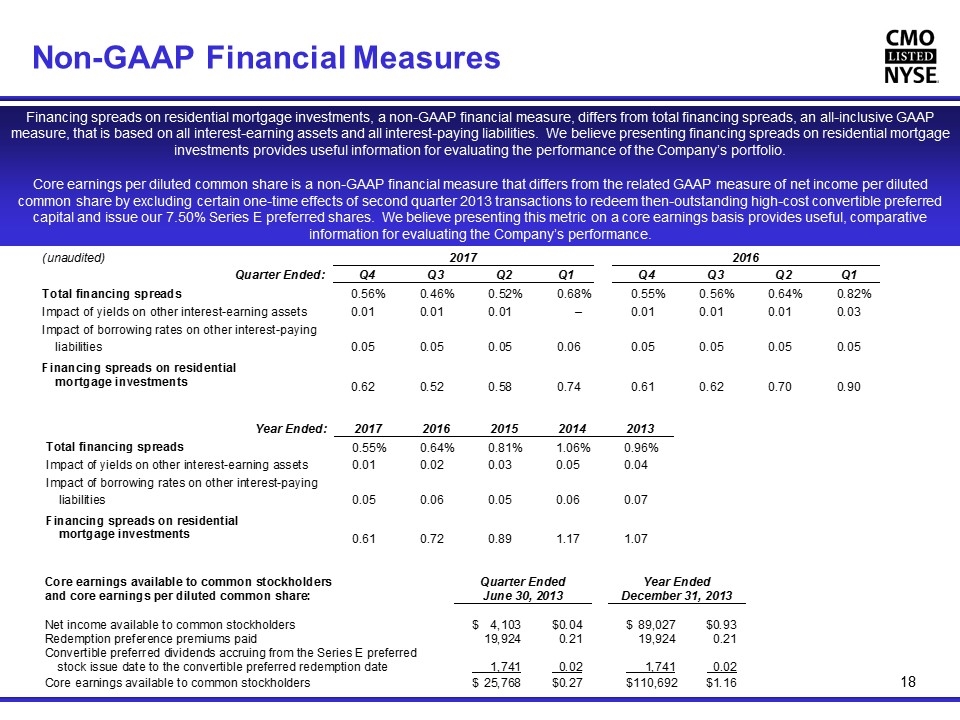
Non-GAAP Financial Measures 18 Financing spreads on residential mortgage investments, a non-GAAP financial measure, differs from total financing spreads, an all-inclusive GAAP measure, that is based on all interest-earning assets and all interest-paying liabilities. We believe presenting financing spreads on residential mortgage investments provides useful information for evaluating the performance of the Company’s portfolio. Core earnings per diluted common share is a non-GAAP financial measure that differs from the related GAAP measure of net income per diluted common share by excluding certain one-time effects of second quarter 2013 transactions to redeem then-outstanding high-cost convertible preferred capital and issue our 7.50% Series E preferred shares. We believe presenting this metric on a core earnings basis provides useful, comparative information for evaluating the Company’s performance. Core earnings available to common stockholders Quarter EndedYear Endedand core earnings per diluted common share:June 30, 2013December 31, 2013Net income available to common stockholders$4,103$0.04$89,027$0.93Redemption preference premiums paid19,9240.2119,9240.21Convertible preferred dividends accruing from the Series E preferredstock issue date to the convertible preferred redemption date1,7410.021,7410.02Core earnings available to common stockholders$25,768$0.27$110,692$1.16
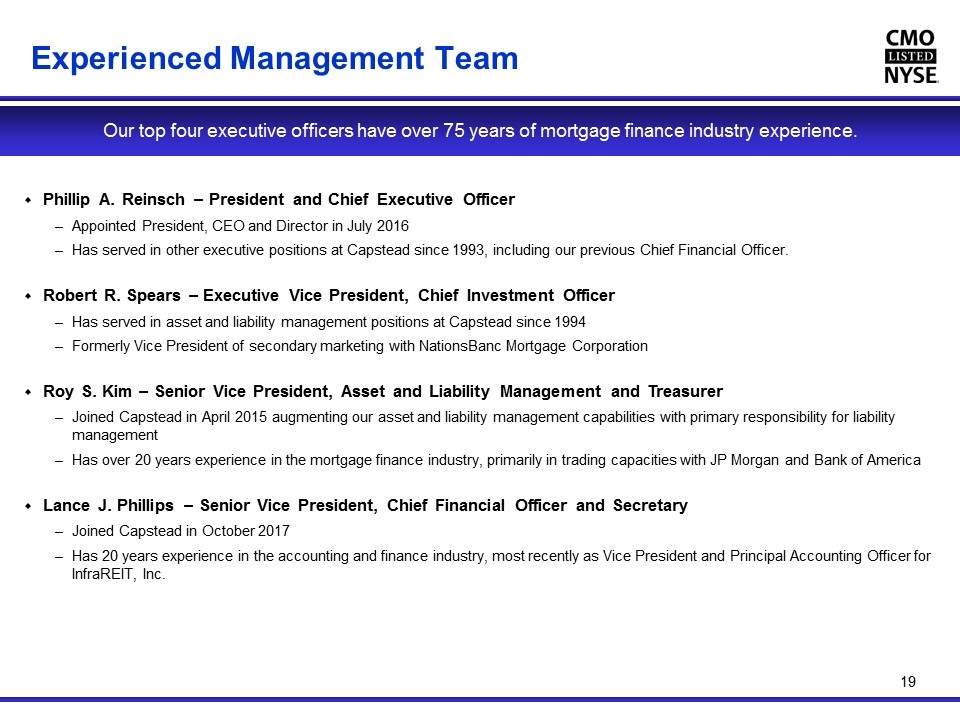
Experienced Management Team 19 Our top four executive officers have over 75 years of mortgage finance industry experience. Phillip A. Reinsch – President and Chief Executive Officer Appointed President, CEO and Director in July 2016 Has served in other executive positions at Capstead since 1993, including our previous Chief Financial Officer. Robert R. Spears – Executive Vice President, Chief Investment Officer Has served in asset and liability management positions at Capstead since 1994 Formerly Vice President of secondary marketing with NationsBanc Mortgage Corporation Roy S. Kim – Senior Vice President, Asset and Liability Management and Treasurer Joined Capstead in April 2015 augmenting our asset and liability management capabilities with primary responsibility for liability management Has over 20 years experience in the mortgage finance industry, primarily in trading capacities with JP Morgan and Bank of America Lance J. Phillips – Senior Vice President, Chief Financial Officer and Secretary Joined Capstead in October 2017 Has 20 years experience in the accounting and finance industry, most recently as Vice President and Principal Accounting Officer for InfraREIT, Inc.
